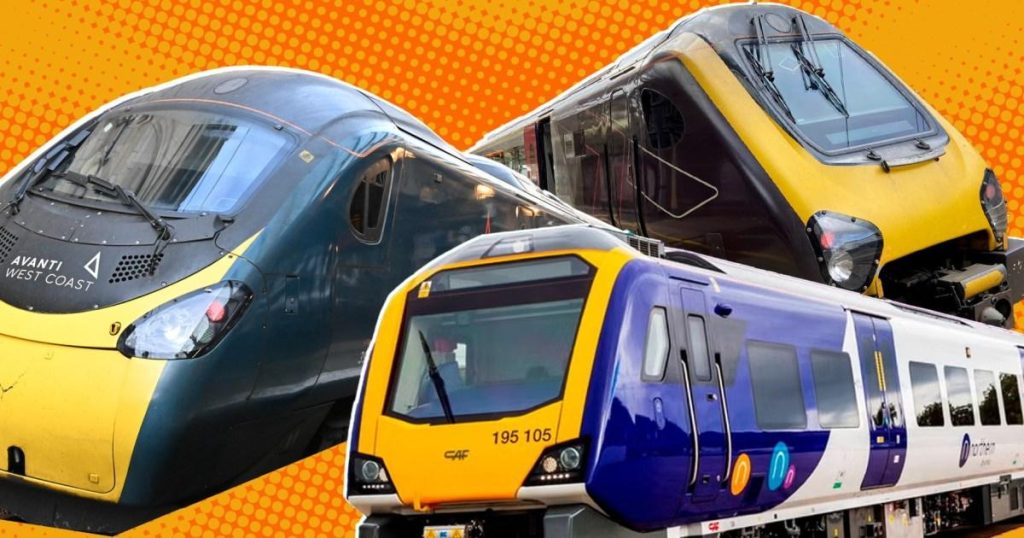The UK rail network experienced a tumultuous year marked by widespread disruptions and cancellations, eroding passenger confidence and raising concerns about the future of rail travel. An analysis of Office of Rail and Road (ORR) data reveals a stark picture of unreliable service, with over 360,000 train services either fully or partially cancelled. This translates to a cancellation score of 4.0%, the worst joint reliability performance since records began in March 2015 when the score was a mere 1.9%. The persistent issues have sparked criticism of both train operators and the government, with accusations of mismanagement and inadequate investment contributing to the deteriorating situation. Passengers, left stranded on platforms or stuck on delayed trains, express growing frustration with the state of the rail network.
Avanti West Coast emerged as the worst offender, registering the highest cancellation score of 7.8%. Trailing closely behind were CrossCountry with 7.4%, Northern with 5.7%, and Govia Thameslink Railway with 5.2%. The cancellation score, a metric used within the rail industry, assigns a value of one to full cancellations and half to partial cancellations, providing a quantifiable measure of service disruption. While these operators bore the brunt of the criticism, the problem extended across the network, impacting millions of journeys. In contrast, C2C, operating between London and Essex, stood out as a beacon of reliability, achieving a significantly lower cancellation score of 1.6%, highlighting the disparity in performance across different operators.
Several factors contribute to the pervasive issue of train cancellations. A prominent one is the significant staffing shortages, particularly impacting weekend services. Many operators rely on drivers and guards working overtime on Sundays, a system that has proven increasingly fragile. Great Western Railway, Northern, and ScotRail are among those grappling with this challenge, leading to frequent disruptions. Beyond staffing, broader infrastructural issues, such as track and signaling faults, further exacerbate the problem. External factors, including adverse weather conditions, flooding, and even trespass incidents, also contribute to delays and cancellations, compounding the challenges faced by operators.
The situation has ignited a debate about the role of government policy and the structure of the rail industry. Critics point to the successive governments’ perceived failure to address the underlying staffing issues, accusing them of neglecting crucial investments in the workforce. This “poor performance,” as described by Modern Railway journalist Tony Miles, not only inconveniences passengers but also actively discourages rail travel, pushing people back onto the roads, counteracting government ambitions for sustainable transport. Concerns have been raised about the aging workforce, with drivers retiring faster than they are being replaced, creating a “ticking time bomb” that threatens to worsen the situation further. The call for a more proactive approach to recruitment and training is growing louder.
The Department for Transport (DfT) has acknowledged the widespread dissatisfaction with rail services, admitting that passengers are being “let down.” They emphasize their commitment to a significant overhaul of the railways, aiming to prioritize passenger needs and reinvest in the network. While the DfT states it will not tolerate poor performance and will hold operators accountable, regardless of ownership, the practical implications of this commitment remain to be seen. The transition to public ownership is presented as a key step towards improving services, but the complexity of this process and its ultimate impact on performance remain open questions.
Passenger advocacy groups, such as Campaign for Better Transport, stress the need for collaborative action. They urge the rail industry and the government to work together, investing in both the workforce and infrastructure to improve reliability across the network. They argue that consistent delays and cancellations erode passenger trust, ultimately undermining the viability of rail travel as a sustainable and reliable mode of transportation. The Rail Delivery Group (RDG), representing train operators, acknowledges the importance of reliable service. They highlight the efforts of rail staff and the industry’s collaborative approach to address the root causes of disruptions. While the RDG points to various factors contributing to delays and cancellations, including weather, industrial action, and infrastructure issues, the onus remains on them to implement effective solutions. They emphasize raising awareness of delay repay compensation to ensure passengers can claim their entitlements, offering some measure of redress for the inconvenience caused.











